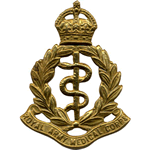Commemorated: | |||
| 1. Memorial: | Baghdad (North Gate) War Cemetery | III. J. 2. | |
| 2. Book: | The (1921) Masonic Roll of Honour 1914-1918 | Pg.132 | |
| 3. Memorial: | The (1940) Scroll - WW1 Roll of Honour | 55B GQS | |
Awards & Titles: | |||
Family :
Husband of Emma Kathleen Pearson, of Rose Mount, Bearstead, Maidstone. Born at Buxton.Service Life:
Campaigns:
- The First World War 1914-1918, World-wide.
| Unit / Ship / Est.: 41st Field Ambulance |
| Action : Mesopotamia |
At the outbreak of war the British, together with Indian troops, resolved to protect oil supply in the region by occupying the area around Basra at Abadan. This evolved into a series of campaigns towards Baghdad against the Turkish forces as Mesopotamia (modern Iraq) was part of the Ottoman Empire. Meetings in late 1914 and into 1915 led the Viceroy and Indian government at Simla to reconsider the limited involvement of troops and they decided to order further advances with a view to securing the Shatt-al-Hai, a canal connecting the Tigris and Euphrates river and potentially capturing Baghdad. The British government disagreed and wished to conserve forces for the Western front. The Viceroy was given permission to act as it wished, but told in no uncertain terms that no reinforcements should be expected.
The initial success experienced by the British and Indian forces quickly disintegrated in the face of Ottoman opposition. The Siege of Kut-Al-Amara began on 7th December with the besieging of an 8,000 strong British-Indian garrison in the town of Kut, 100 miles south of Baghdad, by the Ottoman Army. These campaigns produced few tactical benefits, indeed the catastrophic defeat at Kut in 1916 was a major setback. Badhdad was eventually taken in March 1917.
The conditions in Mesopotamia were dreadful. The climate, sickness and disease produced large losses in addition to battle casualties. About as many men died of disease as were killed in action. The Mesopotamia front was part of a strategy hoping for success at lower cost than the Western Front but no decisive victory was achieved.
Detail :
A biography can be found at Buxton War Memorials. Repeated here:
"Walter was born in the June quarter 1884 at Bath Terrace, Buxton, Derbyshire, eldest son of James (Gasworks labourer) and Martha Pearson The family had moved to Darwin Avenue, Buxton (1901 Census RG 13/3269) and Walter was employed as a "Printer and Publishers Clerk". He had two older sisters, Amy and Mabel B., and 2 younger siblings, Beatrice C. and Fred. In 1902 Walter became Assistant Sectretary to The Devonshire Hospital, Buxton, moving to become Secretary to Gravesend Hospital in 1908. The 1911 Census (RG 14/3814) confirms that Walter had moved to lodge at 60 The Terrace, Gravesend, and was employed as a "Hospital Secretary".
In February 1916 he married Emma Kathleen Jewell, in Maidstone, and in less than two weeks had left for Mesopotamia, where he spent the rest of the War, and still lies there. During the War Emma worked as a Nurse in Leicester and afterwards lived at Rose Mount, Bearstead, Maidstone.
After his death a colleague wrote of him: "His collectors and helpers were always sure of his leadership and he was not content to measure his success or theirs merely by the higher total which these organisations used to show years after year. His success lay in making the Hospital a centre of local interest and in creating a personal tie between it and most of the local residents. While quietly at work at Gravesend he had his ambitions which were hardly apparent to those who had not the clue to his genial and easy going manner. We recall a long conversation with him on the difficulties and slowness of promotion in hospital life, and how he compared, with a sense rather of amusement rather than annoyance, the salaries obtainable in commercial life to men with responsibilities equal to those of a hospital secretary." ("The Hospital" - see below)
The same article pointed out that Walter's predecessor at the Hospital, Mr. A. E. Thomas, had been killed in France in November 1914. (This would be Sgt. Albert Edward Thomas, aged 42, Honourable Artillery Company, killed in action 25th November 1914) When reporting Walter's death in its edition of 8th June 1918, The Buxton Advertiser was unstinting in its praise of a former employee, stating that: "It is some years since the deceased left Buxton, but there are many who cherish the memory of a typical upright Englishman, the embodiment of civility and courtesy, and a characteristic integrity which marked all his dealings."
Walter enlisted in the Royal Army Medical Corps in November 1915 and his Medal Index Card shows that he entered the War in Mesopotamia on 26th February 1916. The 41st Field Ambulance Company was part of the 13th (Western Division) which had been in Gallipoli and suffered over 6,000 casualties. It was evacuated to Egypt in late January 1916 and was brought back up to strength. It is likely that this is where Walter joined his Battalion.
The Division was dispatched to Mesopotamia (modern day Iraq), as reinforcements for Anglo-Indian forces attempting to relieve the siege of Kut. In 1914, Baghdad was the headquarters of the Turkish Army in Mesopotamia. It was the ultimate objective of the Indian Expeditionary Force 'D' and the goal of the force besieged and captured at Kut in 1916. The city finally fell in March 1917, but the position was not fully consolidated until the end of April. Nevertheless, it had by that time become the Expeditionary Force's advanced base, with two stationary hospitals and three casualty clearing stations where Walter may have been deployed.
An article in The Hospital, reprinted in The Buxton Advertiser on the 15th June 1918 reported that Walter had died of burns, following an accident, whilst attached to his Field Ambulance Company in Mesopotamia. Pte. 22879 G.S. BAILEY, also of the 41st Field Ambulance, was killed on the 22nd May 1918, and was also buried in Baghdad Cemetery."
Masonic :
| Type | Lodge Name and No. | Province/District : |
|---|---|---|
| Mother : | Nosocomia No. 3395 E.C. | London |
Initiated | Passed | Raised |
20th October 1909 | 17th November 1909 | 3rd February 1910 |
Senior Deacon. The contribution record records him as a Secretary and resident in Gravesend at the time of his initiation in 1909. It goes on to show his war service with a final note of "Killed in Action May 1918."
Source :
The project globally acknowledges the following as sources of information for research across the whole database:
- The Commonwealth War Graves Commission
- The (UK) National Archives
- Ancestry.co.uk - Genealogy, Family Trees & Family History online
- ugle.org.uk - The records of the United Grand Lodge of England including the Library and Museum of Freemasonry
Additional Source:
- Founder Researchers : Paul Masters & Mike McCarthy
- Researcher : Bruce Littley

